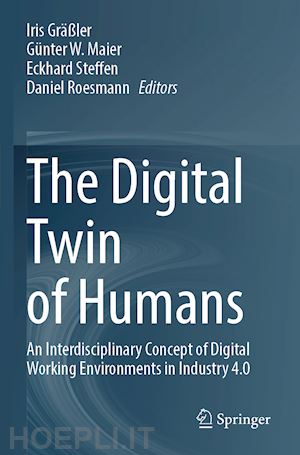
Questo prodotto usufruisce delle SPEDIZIONI GRATIS
selezionando l'opzione Corriere Veloce in fase di ordine.
Pagabile anche con Carta della cultura giovani e del merito, 18App Bonus Cultura e Carta del Docente
This book provides an interdisciplinary concept of digital working environments in industry 4.0 to enable the implementation of the digital twin of humans.
Information and communication technology is penetrating all areas of daily life at a rapid pace in private and professional areas. These technologies enable companies to aggregate huge volumes of data. Collected personal data of employees creates the opportunity of a digital representation of the human being itself, that is conformant with the definition of a digital twin. These digital twins of humans include selected characteristics and behaviour of the humans, that are linked to models, information, and data. According to existing trend studies, the digital twin of humans is a technology that will have a significant impact on the economy, society, and people. It is important to consider the regulatory framework for the use of personal data and threats of misuse.
This book will be of use to researchers and professionals in industry.











Il sito utilizza cookie ed altri strumenti di tracciamento che raccolgono informazioni dal dispositivo dell’utente. Oltre ai cookie tecnici ed analitici aggregati, strettamente necessari per il funzionamento di questo sito web, previo consenso dell’utente possono essere installati cookie di profilazione e marketing e cookie dei social media. Cliccando su “Accetto tutti i cookie” saranno attivate tutte le categorie di cookie. Per accettare solo deterninate categorie di cookie, cliccare invece su “Impostazioni cookie”. Chiudendo il banner o continuando a navigare saranno installati solo cookie tecnici. Per maggiori dettagli, consultare la Cookie Policy.